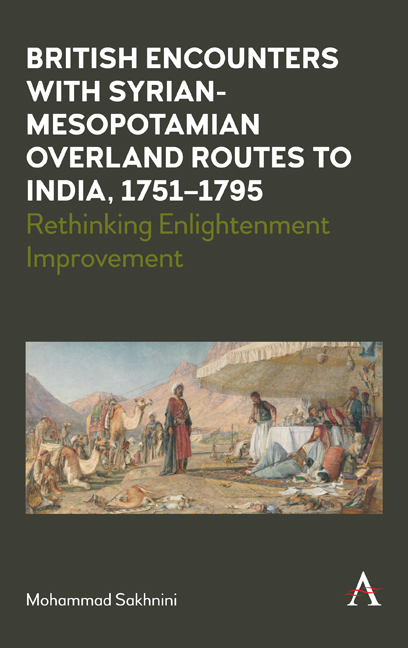 British Encounters with Syrian-Mesopotamian Overland Routes to India, 1751-1795
British Encounters with Syrian-Mesopotamian Overland Routes to India, 1751-1795 Book contents
- Frontmatter
- Contents
- Acknowledgment
- Introduction: Pluralising The Enlightenment: Improvement And Cross-Cultural Encounters
- Chapter One Improvement of Knowledge: John Carmichael’s A Journey From Aleppo to Busserah, Over the Desert (1772)
- Chapter Two Polite Englishman in the East: Edward Ives’s Journey from Persia to England (1773)
- Chapter Three Commerce, Virtue and Improvement: Abraham Parsons’s Travel in Asia and Africa (1808)
- Chapter Four Henry Abbott: A Cosmopolitan in Cities and Deserts
- Chapter Five Eyles Irwin’s Travels: The Politics of Adventure in the Levant
- Chapter Six Political and Moral Improvement: Donald Campbell, A Journey Overland to India Partly by A Route Never Gone Before by Any European (1795)
- Conclusion
- Unpublished Manuscripts
- Reference List
- Index
Chapter One - Improvement of Knowledge: John Carmichael’s A Journey From Aleppo to Busserah, Over the Desert (1772)
Published online by Cambridge University Press: 15 November 2023
- Frontmatter
- Contents
- Acknowledgment
- Introduction: Pluralising The Enlightenment: Improvement And Cross-Cultural Encounters
- Chapter One Improvement of Knowledge: John Carmichael’s A Journey From Aleppo to Busserah, Over the Desert (1772)
- Chapter Two Polite Englishman in the East: Edward Ives’s Journey from Persia to England (1773)
- Chapter Three Commerce, Virtue and Improvement: Abraham Parsons’s Travel in Asia and Africa (1808)
- Chapter Four Henry Abbott: A Cosmopolitan in Cities and Deserts
- Chapter Five Eyles Irwin’s Travels: The Politics of Adventure in the Levant
- Chapter Six Political and Moral Improvement: Donald Campbell, A Journey Overland to India Partly by A Route Never Gone Before by Any European (1795)
- Conclusion
- Unpublished Manuscripts
- Reference List
- Index
Summary
Plac’d in this isthmus of a middle state,
A being darkly wise and rudely great,
With too much knowledge for the sceptic side,
With too much weakness for the stoic pride.
—Alexander Pope, An Essay on Man (1733)John Henry Grose’s Voyage to the East Indies (1757) offered ‘a faithful recital of facts’ collected during the many years of his service at the East India Company’s (EIC) military station in Bombay. Grose’s book enjoyed a brief period of popularity immediately upon its publication. Indeed, many eighteenth-century travel writers and authorities on travel and exploration praised the book for its detached and scientific style, which was important for informing the public about British wars and imperial expansions abroad. But the spontaneous style of Grose’s book – the fact that he reported on what he observed in a forensic manner without necessarily showing that he had background knowledge of the region – was little appreciated by some. The Monthly Review (1757), for example, accused Grose of exploring Oriental ‘theology’ without showing any expertise on the topic (1757: 302). The Critical Review in 1758 did not ‘recommend’ the book because ‘the stile is stiff and labored’ and ‘in some parts of the performance absolutely unintelligible’ (1758: 319). Yet, all agreed, as the Critical Review affirmed, that Grose’s book offered valuable information relating to ‘the interests of England’ in the East Indies (1758: 319). After all, the book was published during a period in which the EIC was battling the French and their Indian allies in the Carnatic region. This view of travel writing as a valuable means to promote ‘the interests of England’ appeared in an age of rapid British imperial expansion in the East, which encouraged Grose to add to the 1772 edition of his book a short travel narrative titled A Journey from Aleppo to Busserah, written by the Scotsman John Carmichael, who travelled along the overland routes between Europe and India in 1751. Norbert Schürer argued that despite the hostile treatment it received in the press, the Voyage showed a hospitable view of Islam in contrast to Carmichael’s hostile views of Islam and the Prophet Muhammad in his short narrative: ‘it is somewhat surprising that Grose included Carmichael’s “Journal” in his Voyage’ (Schürer 2019: 304).
- Type
- Chapter
- Information
- British Encounters with Syrian-Mesopotamian Overland Routes to India, 1751-1795Rethinking Enlightenment Improvement, pp. 31 - 56Publisher: Anthem PressPrint publication year: 2023


